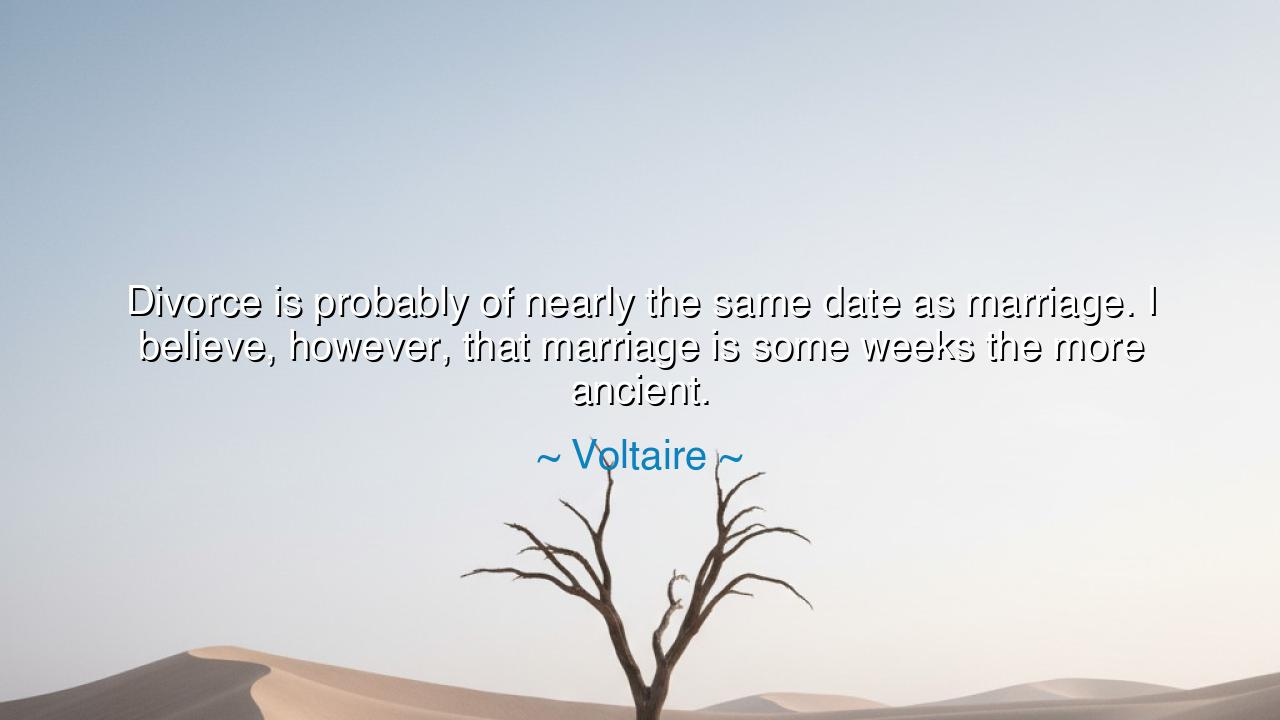
Divorce is probably of nearly the same date as marriage. I
Divorce is probably of nearly the same date as marriage. I believe, however, that marriage is some weeks the more ancient.






In the witty yet profound words of Voltaire, the sage of the Enlightenment, we find both laughter and lament: “Divorce is probably of nearly the same date as marriage. I believe, however, that marriage is some weeks the more ancient.” These words, clothed in irony, are not merely jest. They are the sigh of a philosopher who gazed deeply into the human heart and found there both the divine longing for union and the inevitable frailty of its fulfillment. Voltaire, ever the observer of human folly and hope, reminds us that wherever love has blossomed, disappointment has not lingered far behind—and yet, humanity continues to love still.
The origin of this quote lies in the eighteenth century, when Voltaire, that tireless champion of reason and skeptic of hypocrisy, examined the customs and contradictions of human society. He lived in an age when marriage was as much an institution of economy and lineage as of affection. To speak of divorce in such a time was to challenge the sacred order, for marriage was deemed unbreakable, even when love had perished within it. But Voltaire’s humor carried the sting of truth. He saw that the moment man and woman first bound themselves in matrimony, the seed of separation was already planted—for no promise, however sincere, can bind the restless tides of the human soul forever. In his jest, there is both compassion and realism: he neither condemns love nor mocks it, but acknowledges its imperfection as the price of its beauty.
For love, in its first creation, was a flame divine, yet fragile when housed in mortal hearts. From the dawn of civilization, from the ancient deserts to the marble halls of Greece, men and women have sought the eternal through one another. But the union of two souls is no easy alchemy. As soon as one heart seeks to merge with another, the struggle between freedom and devotion begins. Thus, as Voltaire wryly observes, marriage and divorce are twins born of the same parent—human desire. The first seeks oneness; the second seeks release. Both spring from the yearning to be whole.
Consider the tale of Henry VIII of England, whose quest for love and legacy tore his nation from Rome itself. In his desire to annul a marriage that no longer pleased him, he set fire to the old world and gave birth to the new. His story is the living embodiment of Voltaire’s irony: for in the very act of trying to sanctify marriage, he made divorce a force of revolution. What began as a personal wish for freedom reshaped kingdoms and faiths. Thus, Voltaire’s insight finds its echo through time—marriage and separation are not merely personal acts; they are reflections of the eternal dance between love and liberty.
Yet beneath the jest, there beats a deep compassion for the human condition. Voltaire knew that the heart is both noble and naive—it seeks eternity in what is fleeting, and builds temples on the sands of time. His humor does not mock love’s failures but forgives them. For to marry is to believe, against all reason, that two imperfect beings can create something enduring. And to divorce is to confess, with sorrow, that belief has met the limits of reality. Both are acts of courage: one begins a dream, the other ends an illusion.
The wisdom of Voltaire, though wrapped in irony, invites not cynicism but understanding. He reminds us that no human bond is free from trial, and that love must be renewed or it will fade. To honor marriage, one must nurture it daily, not as a chain but as a living covenant. And should it fail, one must not despise what was, but learn from what remains. For as ancient philosophers taught, wisdom is born from the ruins of desire.
So let this teaching be taken to heart: to love is to risk, and to risk is to live. Do not fear the fragility of marriage, nor worship its permanence as if it were divine. Instead, treat it as the sacred labor of two souls seeking harmony amid the storms of life. If love endures, rejoice; if it falters, forgive. For both marriage and its end remind us of our humanity—that we are beings who reach for eternity, even while bound to time.
And thus, in Voltaire’s playful yet eternal truth, we find both laughter and light. Marriage and divorce, though opposites, are part of the same divine comedy—the story of human hearts learning, again and again, how to love, how to lose, and how to begin anew.






AAdministratorAdministrator
Welcome, honored guests. Please leave a comment, we will respond soon